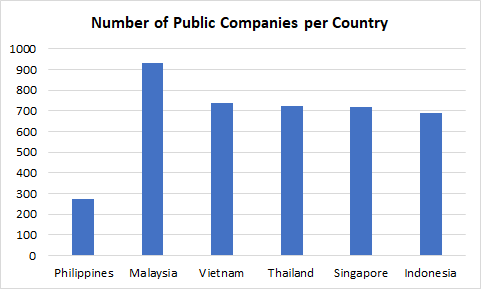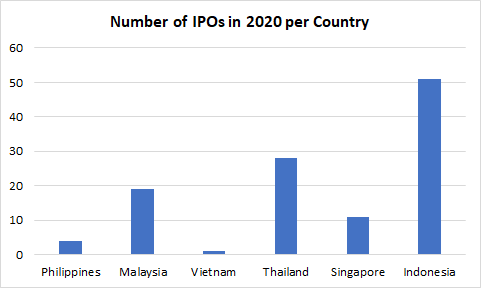MONDAY MACRO: Economic growth may come faster than expected if the Philippines catches up on this statistic

IPOs tend to create a lot of buzz in the Philippines, though it’s partially driven by how rarely they occur. Compared to neighboring countries, the Philippines lags behind in terms of the number of publicly traded companies.
One way to make the IPO market more attractive is by relaxing the listing requirements. While it’s intended to just expand the number of public companies, it may also spur economic growth.
Philippine Markets Daily:
The Monday Macro Report
Powered by Valens Research
The COVID-19 pandemic was the main story in 2020, but the year also had news that excited investors.
For one, the Philippine Stock Exchange (PSE) saw the debut of companies looking to grow amidst the pandemic. In June 2020, grocery retailer MerryMart Consumer Corp. (MM:PHL) made its initial public offering (IPO), relying on its essential goods to drive growth.
Thereafter, Converge Information and Communications Technology Solutions, Inc. (CNVRG:PHL) went public, as the company looked to expand its broadband internet coverage in an underserved market.
The year also saw the introduction of the Philippines’ first Real Estate Investment Trust (REIT), an asset class that offers more stable returns from the income of real estate properties. AREIT, Inc. (AREIT:PHL) has been publicly listed since August 2020.
2021 could be even more exciting. Instant noodle and biscuit manufacturer Monde Nissin is targeting a PHP 63 billion IPO, which will be the largest IPO in Philippine history if all goes according to plan.
In addition, real estate companies DoubleDragon Properties, Inc. (DD:PHL) and Filinvest Land, Inc. (FLI:PHL) are aiming to launch their own REIT in the PSE. In fact, DoubleDragon’s DDMP REIT, Inc. is already set to go public starting next week.
However, despite these new business developments, the number of publicly traded companies in the Philippines still lags behind our Southeast Asian neighbors.
Only 274 firms are listed in the PSE when other bourses have at least 700 public companies.

When looking at the data in terms of growth, the Philippines’ 4 IPOs in 2020 only beat Vietnam, while other peers had anywhere between 10 to 51 IPOs.

Recently, the PSE and the Securities and Exchange Commission (SEC) have been looking to ease some of the IPO requirements. As it currently stands, the IPO requirements are too strict for small and medium enterprises (SMEs) to meet, especially during the pandemic.
Under the new listing framework, SME applicants will no longer need a positive EBITDA within two of the past three years. Larger corporations will be required to have generated PHP 50 million of sales in the past year and PHP 75 million during the past three years, instead of needing PHP 500 million in market cap.
The PSE has also been considering allowing companies to go public by issuing only preferred shares. Preferred shares are similar to common shares, but with a higher claim on a company’s earnings and assets and with usually no voting rights.
The PSE’s proposed measures have yet to get the final approval from the SEC. If approved, these more relaxed criteria would not only expand the number of public companies, but may also greatly benefit the Philippine economy and its recovery.
IPOs can be a signal that there are a lot of innovation and growth opportunities in the country, but businesses are unable to expand as fast as they want due to funding issues. As such, businesses raise capital through the PSE in exchange for stock or ownership of the company.
Newly listed companies often have a growth strategy laid out for where the IPO proceeds will be spent. Such strategies are usually about building more factories or addressing new markets, both of which create employment opportunities.
Another benefit would be the interest IPOs create. Companies that seem to have a huge potential for growth can create a lot of hype prior to their IPO. It attracts new people who would have never thought about investing and familiarizes them with how to maintain or improve wealth.
Although the PSE’s proposal only aims to expand the available publicly traded companies, it may have an additional effect of spurring economic growth.
With how we are already expecting to see economic and corporate fundamentals improve in 2021, this new listing framework may just help make economic growth a certainty.
About the Philippine Market Daily
“The Monday Macro Report”
When just about anyone can post just about anything online, it gets increasingly difficult for an individual investor to sift through the plethora of information available.
Investors need a tool that will help them cut through any biased or misleading information and dive straight into reliable and useful data.
Every Monday, we publish an interesting chart on the Philippine economy and stock market. We highlight data that investors would normally look at, but through the lens of Uniform Accounting, a powerful tool that gets investors closer to understanding the economic reality of firms.
Understanding what kind of market we are in, what leading indicators we should be looking at, and what market expectations are, will make investing a less monumental task than finding a needle in a haystack.
Hope you’ve found this week’s macro chart interesting and insightful.
Stay tuned for next week’s Monday Macro report!
Regards,
Angelica Lim
Research Director
Philippine Markets Daily
Powered by Valens Research
www.valens-research.com




